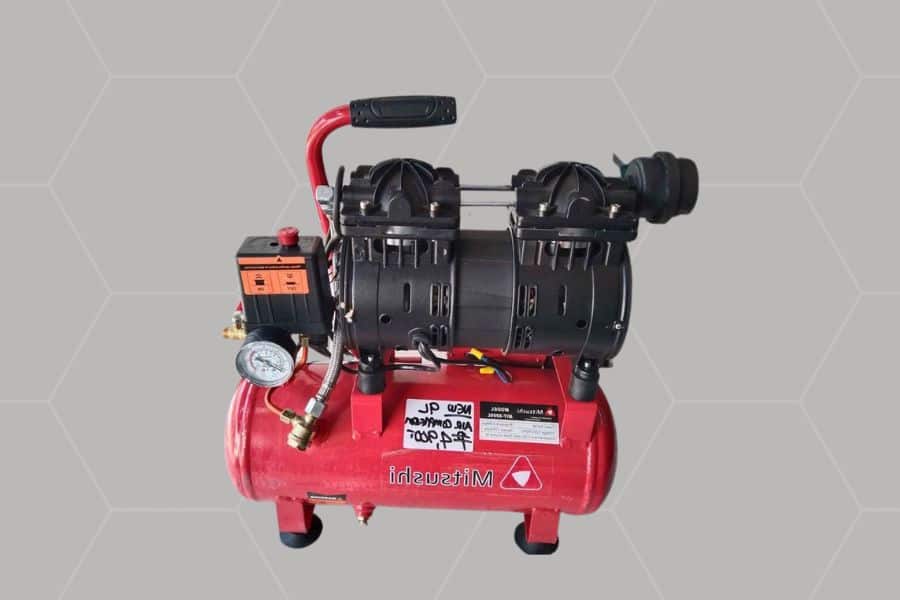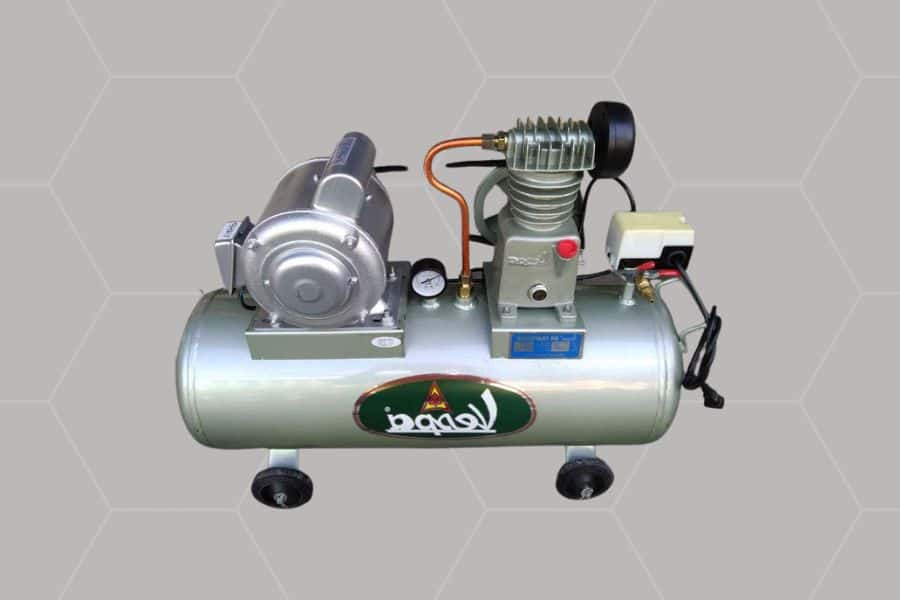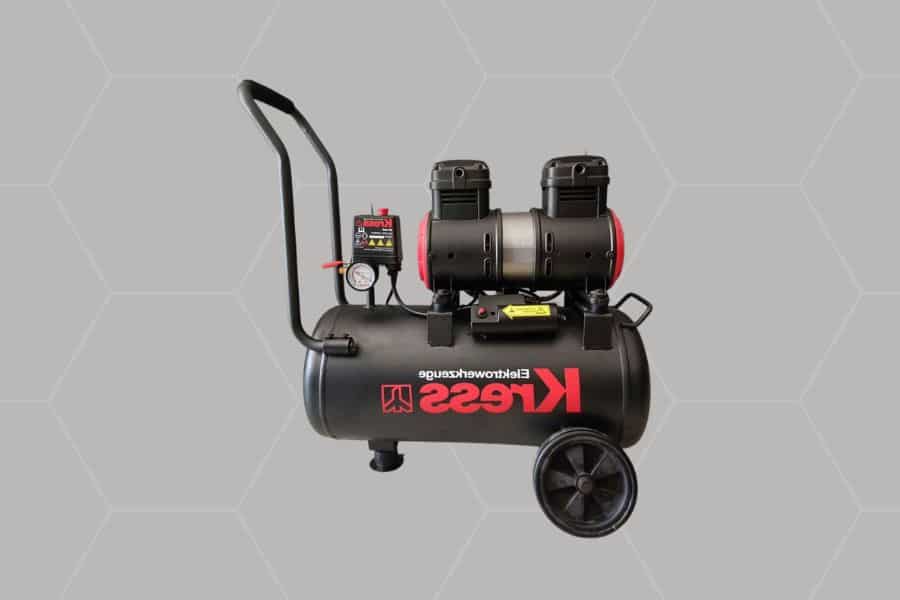If you have used an oilless air compressor, chances are it runs really loud. You’re probably here to know how to quiet an oilless air compressor and what you can do to keep the noise to a minimum.
Contents
- How to Quiet an Oilless Air Compressor
- Equip a Sound Muffler on Your Oilless Air Compressor
- Use Components That Will Make Your Oilless Air Compressor Quiet
- Modify Your Oilless Air Compressor to Reduce the Noise
- Make Use of Installation Placement
- Make Your Workroom Soundproof
- Do Regular Maintenance and Cleaning
- Take a Health and Safety Training
- Reasons Your Air Compressor Is Loud
- How Loud Can Air Compressors Get
- Which Is Quieter? Oiled Air Compressors or Oilless Air Compressors
- Conclusion
How to Quiet an Oilless Air Compressor
Air compressors need a lot of power, and that’s why they can sometimes get noisy. There are some things you can do to reduce the noise. First off, there are models that generally run loud while other models run quietly.

If you still haven’t bought one yet, you may want to get one that runs quietly. If not, there are multiple ways you can make sure it doesn’t disturb your neighbors and your family. Here’s how:
Equip a Sound Muffler on Your Oilless Air Compressor
A muffler or a silencer can help reduce the noise of your compressor. It’s one of the best options you can use for making your oilless machine quiet regardless of the model. There are different types of mufflers for compressors, and there’s bound to be one that exactly fits your model.
The muffler doesn’t affect the effectiveness of your compressor, so there’s nothing you should worry about it. You should install the muffler at the outside part where the noise is usually generated. It will greatly reduce the noise made by your compressor.
Use Components That Will Make Your Oilless Air Compressor Quiet
There are many types of materials that can make up the components of an air compressor. Some materials actually help reduce and even suppress loud sounds. For example, rubber is a great material that can lessen noise.
Cheaper models generally won’t care about noise reduction features, so they generally are loud because they use low-quality materials. If you want a quiet machine, you have to be prepared to spend a bit more.
Brands like DEWALT generally use high-quality components and materials that make their machine run quietly. You can also refer to their specifications to know if it will run quietly.
Modify Your Oilless Air Compressor to Reduce the Noise
Don’t have a sound muffler or just don’t like to use it? You can make your own modifications to reduce your compressor’s noise. You can make use of rubber and even blankets to reduce the noise of your compressor.
You can make use of sound blankets and cover your compressor with them. You can place it around the piston cylinder to reduce some of the loudness. Sound blankets are cheap compared to getting a sound muffler.
Another modification you can use is rubber grommets. As I mentioned before, rubber is great for reducing noise, so using it as a modification will help. You can add multiple rubber grommets, and they come in different shapes and sizes, so they will fit your compressor machine.
Make Use of Installation Placement
Where you place your air compressor is important if you want to lessen the noise as much as possible. You don’t want to place it in the part of your house where it’s near your neighbor’s hearing range.

You can also install machine compressors on platforms with soft pads and dampeners to reduce the noise created. Compressors can create vibrating noise that can be reduced with the help of thick pads or rubber sheets.
Some compressors run quietly already, so you might not need to use installation platforms for them to run quietly since it doesn’t vibrate upon use.
Make Your Workroom Soundproof
You can also consider soundproofing your workplace so that any noise leaking out wouldn’t be too loud. You can also get a compressor with noise-suppression housing that can help reduce the noise level.
You can build a DIY soundproof enclosure for your air compressor or soundproof the room yourself. The noise suppression housing is usually made of sturdy exterior materials, so it’s better that your compressor is in the right place first.
Some manufacturers sell soundproof boxes with built-in compressor units, which will save you a lot of time. You can also hire some professionals to soundproof your workroom for you to save time and ensure it really is soundproof.
Do Regular Maintenance and Cleaning
Make sure you are regularly cleaning your compressor unit that is oilless. While regular compressors need maintenance since oiling and lubricating them actually reduces noise levels, the same can also be applied to oilless compressors.
Some clogs may be the cause of increased noise, and some loose parts may also contribute to the excessive loudness of your compressor. Hence maintaining it regularly should identify this problem and keep your compressor as quiet as possible.
You can also rely on experts to do the maintenance for you, they might be able to spot a noise problem better than you. They can also ensure your components are working or need replacement to ensure your air compressor’s longevity.
Take a Health and Safety Training
You will be surprised that taking safety awareness training actually helps you lessen the noise your oilless compressor makes. Noise from your oilless compressor can be a sign of fatigue, wear, and tear, so being able to identify it will help you keep your compressor for long.
Reasons Your Air Compressor Is Loud
There are different factors that can cause your compressor machine to run loud. If you can identify them, it will be easier for you to address the problem and make your compressor machine run quietly.
- Air intake – taking the air is a fundamental thing for compressors, and that is the main reason why they are loud.
- Exhaust – the exhaust works the same way as air intake, so it also makes a lot of noise when in use.
- Vibrations – all compressors vibrate, and the difference between them is how many vibrations they make. Depending on the placement and intensity of vibrations, it may be the cause of the loudness.
- Location – where your compressor is placed also is a factor in why it is loud. The noise made from the compressor might echo off, amplifying its loudness outside the room. Its vibrations could also contribute to the noise generated, so having some thick pads to support it would help reduce its noise.
- Material quality – low-quality materials tend to not have noise-suppressing features. Whereas high-quality materials can lessen noise most of the time.

How Loud Can Air Compressors Get
Air compressors generally have noise levels between 40 to 90 decibels. Noise levels above 85 may cause some hearing damage. That’s why most users of compressors wear ear mufflers to protect their ears from damage.
Sounds as loud as 130 to 140 decibels can be painful to your ears, so it’s important to ensure your compressor isn’t too loud.
Recommended Noise Level for Air Compressors
The recommended noise level for air compressors is anything below 60 decibels. It should also have effective noise-reduction systems in place and have certification for low-noise ratings.
Which Is Quieter? Oiled Air Compressors or Oilless Air Compressors
Oiled air compressors generally are quieter than oilless air compressors. This is thanks to the oil and lubrication that lessens the friction, which in turn lessens the noise the compressor makes.
Oilless air compressors, on the other hand, don’t have such lubrication, so they rely on material quality to keep the compressor running quietly. Even with low-noise features, an oiled air compressor would generally run quieter.
Oiled air compressors also need to apply oil or lubrication to make them run quietly. For oilless compressors, you may have to check their components for wear and tear and make some modifications to make them run quietly.
Conclusion
Oilless air compressors can run quietly as long as you know what you are doing. There are low-noise compressors out there with some noise-suppression features to keep it running quietly.

